Picking a pup for your family requires research, as not every four-footer fits every lifestyle. A high-energy breed needs daily, vigorous exercise, while a couch potato canine would rather tell you to take a hike than join you on the trail.
If you’re seeking a smart, sassy dog on the petite side, a small terrier breed might be your perfect pupper.
Below, we’ll share small terrier breeds and explain what living with one of these personality-packed pooches is like.
What Is a Terrier Breed?
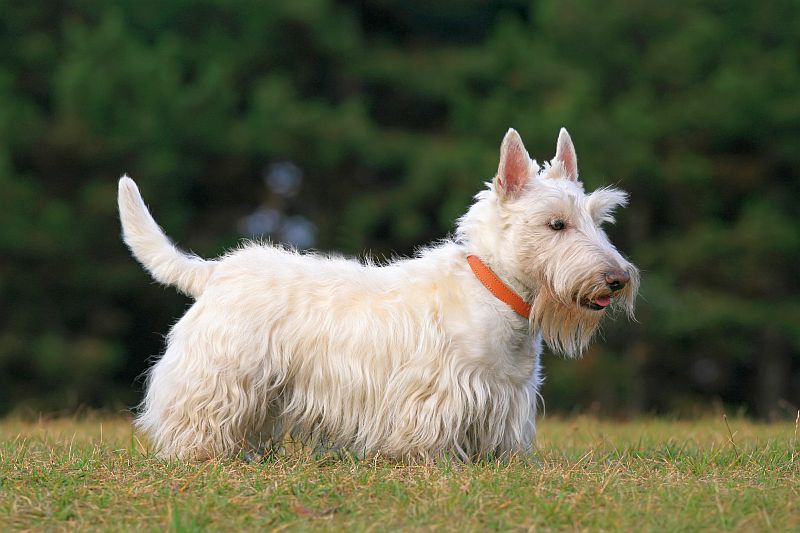
Terriers are a group of dogs originally bred to catch and kill vermin around the farm or homestead. These pups are diverse in appearance, with large terriers like the Airedale impressing with power while small terrier breeds like the Norwich reign supreme as relentless ratters.
In the American Kennel Club (AKC), most terrier breeds fall into the Terrier group, but you can find others elsewhere, including the Teddy Roosevelt terrier in the Miscellaneous category, the standard and giant schnauzers in the Working Group, and tiny terriers like the Yorkshire in the Toy Group.
The United Kennel Club (UKC) categorizes most terriers the same, with the majority in the Terrier Group. Exceptions include the Biewer and Yorkie, which are in the Companion Group.
Today, we’re going to cover a subset of the group and focus on the little ones and discuss 27 small terrier breeds who typically weigh less than 25 pounds (including a few from other AKC categories).
The 27 Best Small Terrier Breeds
There are more than two dozen small terrier breeds, and they come in a broad range of coats, colors, shapes, and personalities. Let’s meet them and see if any suit your family’s lifestyle.
1. American Hairless Terrier
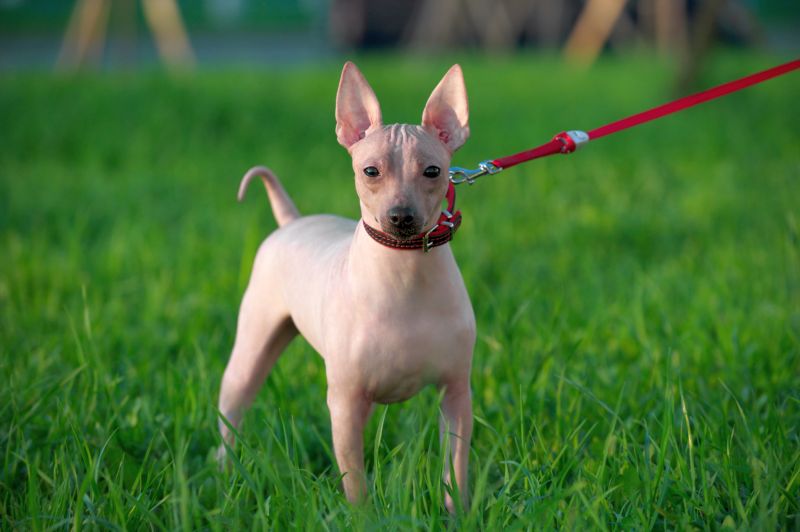
Clocking in at 16 pounds, this terrier stands between 12 and 16 inches at the shoulder. Despite the name, this Louisiana native comes in hairless and coated varieties. Grooming both types is a breeze as you can just wash your pup as needed, but you’ll need to protect a hairless pooch from sunburn with a dog-safe sunscreen.
This southern gentleman is among the easiest small terrier breeds to train, as he’s eager to please and less inclined to go rogue. He doesn’t need much exercise, either, doing just fine with a daily walk and backyard play.
2. Australian Terrier
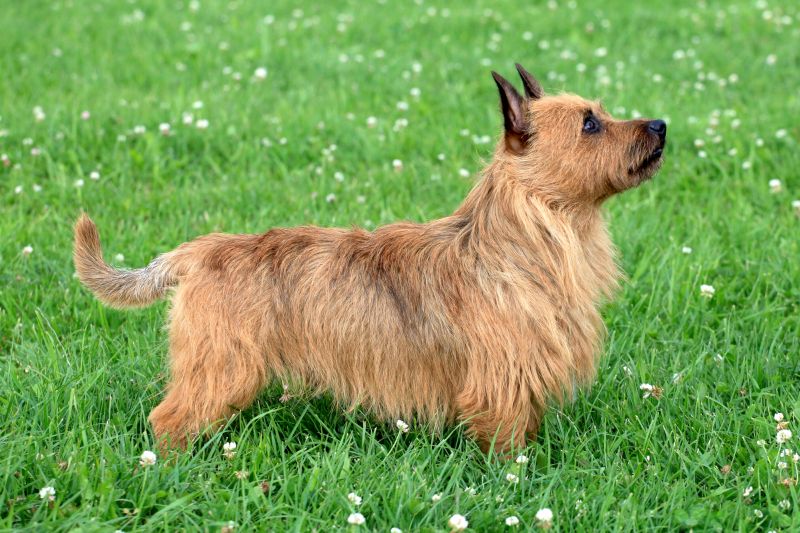
Crikey! This little rascal from down under comes in at a maximum of 20 pounds but still packs a wallop of personality with his lively nature. He’s the first to investigate a new sight, smell, or sound, but this curiosity can spell trouble with his strong hunting instincts, so always keep him leashed outside fenced areas.
He’s a lovable little ham with his family, though he may struggle with sharing his favorite toys and people. Early training and patience are necessary, as he’s one of the more stubborn small terrier breeds.
3. Bedlington Terrier
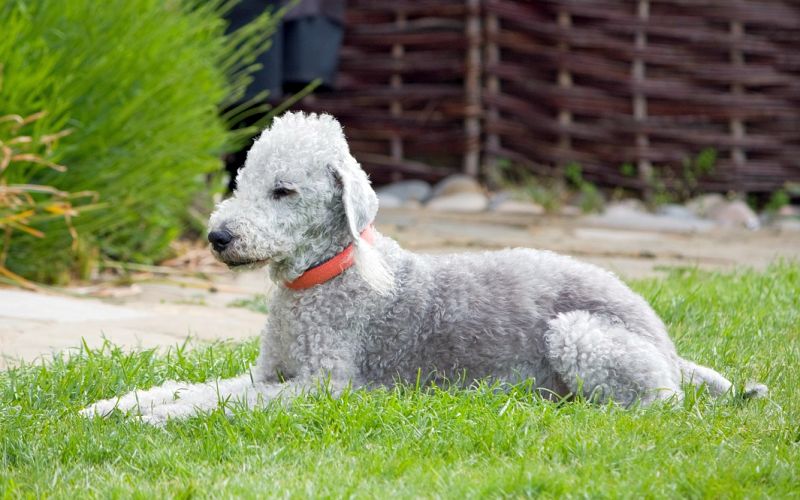
Topping out at 23 pounds and about 17.5 inches in height, the Bedlington is one of the heavier small terriers. Beloved for his sheep-like looks of white curly hair, this English export doesn’t shed much, but you’ll need to have him clipped every eight weeks or so to keep his ‘do in check.
The Bedlington needs daily physical and mental exercise, and like other terriers, he shouldn’t be trusted off-leash since he’ll give chase as he sees fit. He’s a prime candidate for canine competitions like Earthdog and agility but stick to positive reinforcement training methods to avoid damaging his sensitive spirit.
4. Biewer Terrier
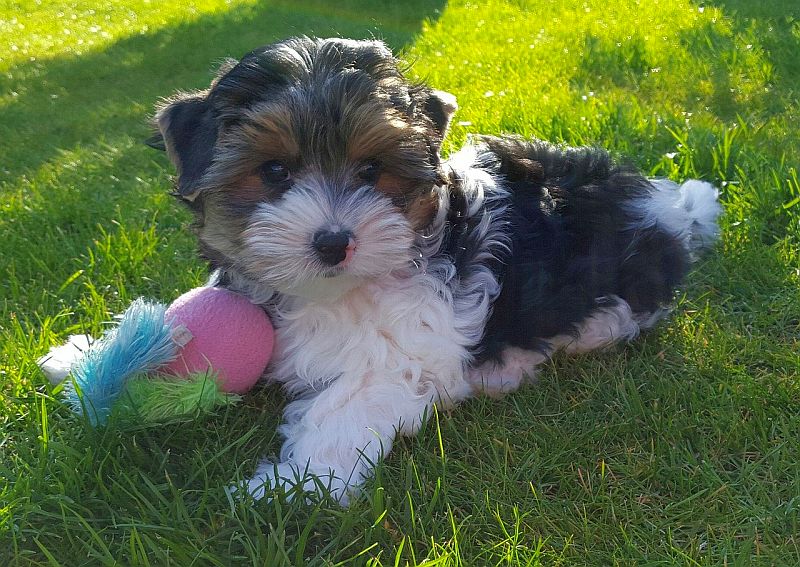
Long-haired and loving, this tricolor toy breed weighs a maximum of 8 pounds. He’s incredibly affectionate and a top choice for a family dog, though his small size is best suited to older kiddos. The Biewer is easier to train than most terriers, though housetraining can be tedious.
Grooming is the trickiest aspect of owning a Biewer, as his long, luscious locks require daily combing to prevent tangles. Clipping his coat short every few weeks is often best, making your routine more manageable. Brush his teeth regularly, too, as he’s prone to dental issues.
5. Border Terrier
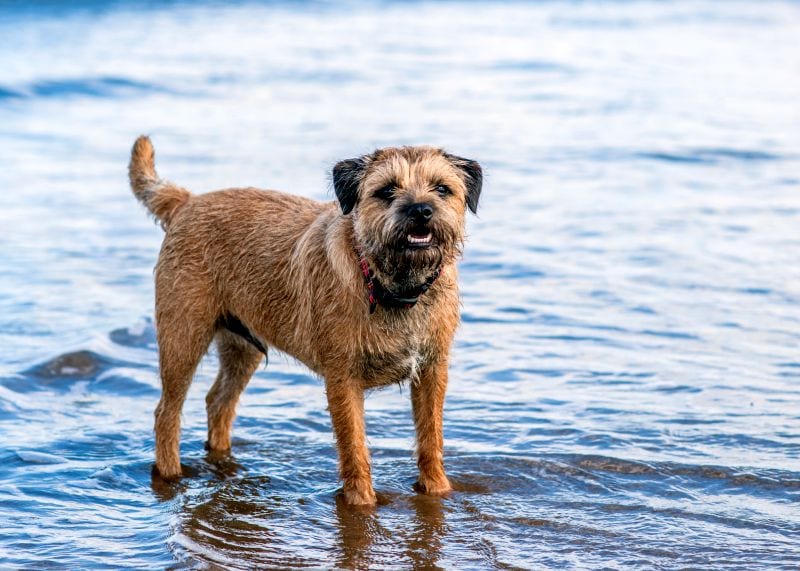
The border terrier is a charismatic cutie weighing up to 15 pounds and loving adventure, so if you’re after a ready-to-roll rover, he’s your guy. With a working drive a mile wide, daily exercise is a must, like hiking, chasing vermin, or playing sports like Flyball.
The border terrier is one of the easier terrier types to groom, only requiring occasional brushing to remove coat debris and loose hair. He is famously stubborn, so newbie owners should look for another terrier.
6. Cairn Terrier
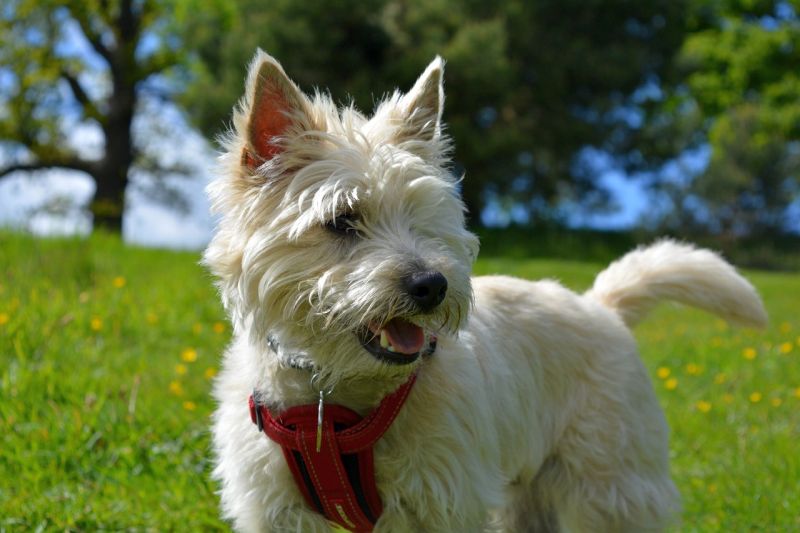
This terrier is hell on paws for vermin, as he originated chasing them from Scottish rock mounds called cairns, earning his name. These strong hunting instincts mean keeping him on a leash at all times beyond your yard is a must. They also make squeaky toys a hit.
Famously appearing as Toto in The Wizard of Oz, the cairn terrier has earned fans worldwide, though he’s not a good fit for every household. He’s sweet and agreeable to family life but strong-willed, making training a challenge.
7. Cesky Terrier
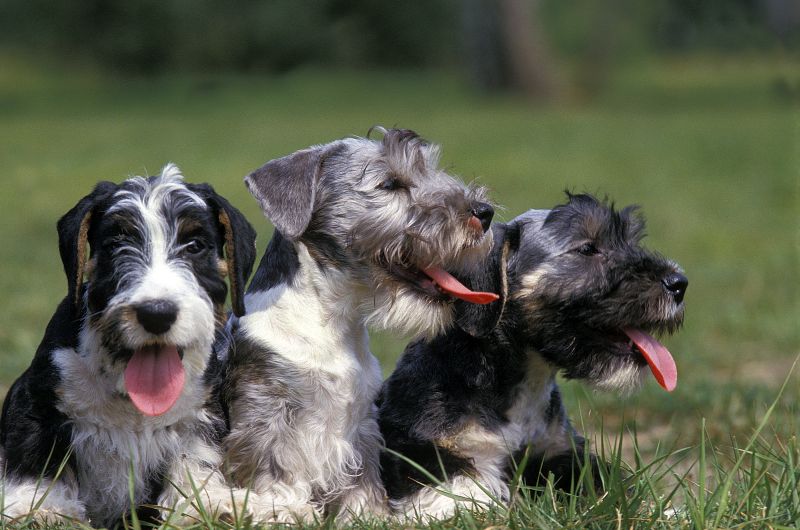
Ranging from 14 to 24 pounds, the Cesky is a rare Czech breed with a sweet side for people and other pups. However, he still has a bit of a prey drive, so keep him leashed beyond the yard and watch him around small animals like cats.
The Cesky isn’t as headstrong as most terriers, so he’s easier to train than most others too. He’s smart as a tack, but remember, he’s a sensitive soul. Never raise your voice or use harsh methods with him.
8. Dandie Dinmont Terrier
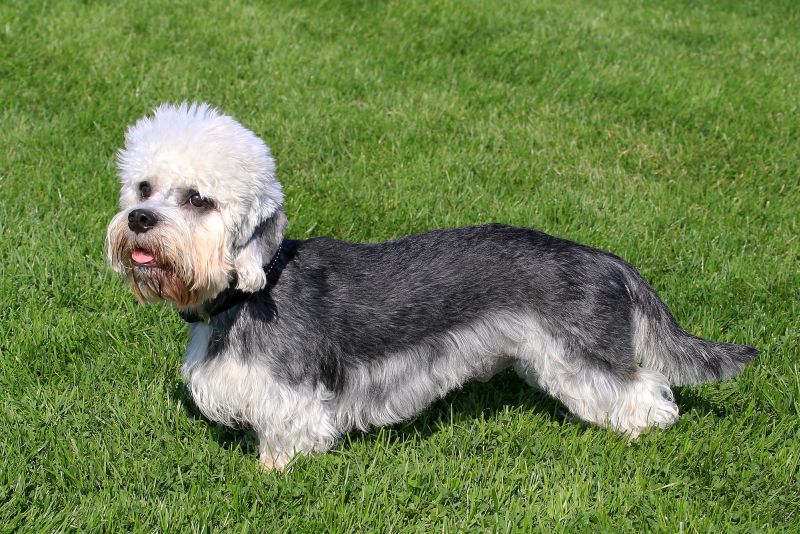
With a happy-go-lucky name and appearance, it’s hard not to love this fluffy-headed Fido. He can be up to 24 pounds, making him one of the heaviest pups among our list of small terrier breeds, but he’s still compact thanks to his long, low build, being 11 inches at most at the shoulder.
As with other terriers, Dandies are hunters, so never trust him off a leash. He’s also a stubborn pup, needing patience and praise during training. Keep training treats and a sense of humor handy with a Dandie!
9. Lakeland Terrier
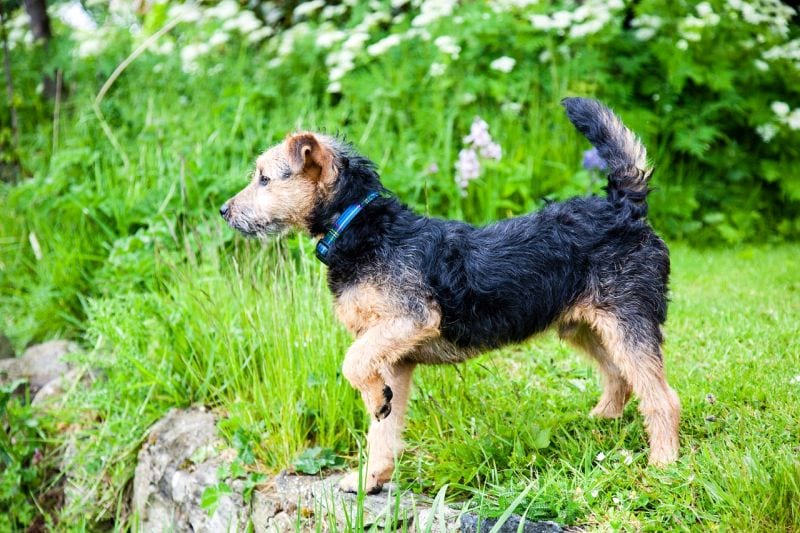
This wiry woof weighs up to 17 pounds but is a big dog at heart. He started out chasing off foxes, and he remains a hunter, bolting after perceived prey if not kept leashed. He’s an active doggo, requiring daily physical and mental exercise like jogging and hiking.
Aside from regular grooming, the most challenging part of owning a Lakeland is training, as he’s an intelligent dog who loses interest fast. Keep training sessions short, positive, and fun. Proper socialization is also critical since he’s known to be persnickety about pup friends.
10. Manchester Terrier
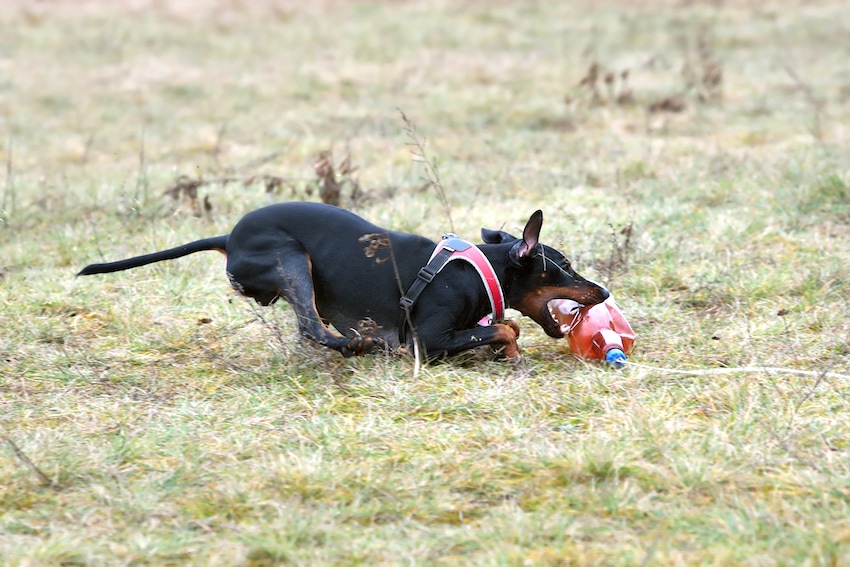
Leggy and lightweight, this English darling weighs between 12 and 22 pounds. He’s a versatile companion, appreciating a good cuddle session as much as a romp around the yard or a jog. He’s smart, too, thriving in training under positive guidance. Just remember to switch sessions up to keep him engaged.
The Manchester terrier’s short coat needs occasional brushing and bathing. His ears require more frequent attention, with regular wipedowns with ear cleaners a must to prevent ickies from building up.
11. Miniature Schnauzer
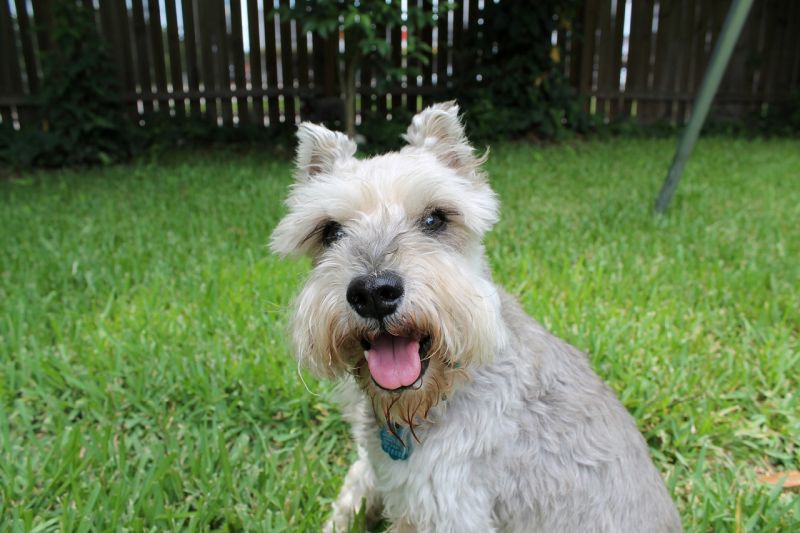
With a mighty beard and epic eyebrows, the miniature schnauzer is a wise old man in appearance but an Energizer Bunny in spirit. Weighing a maximum of 20 pounds, he’s a lively yet loving companion, flourishing in family environments and adult-only households alike as long as he’s exercised daily with walks and play.
The miniature schnauzer requires regular grooming appointments and frequent combing between visits to prevent tangles. You’ll need to invest in quality grooming tools and learn the tricks of the trade or find a trusted groomer in your area for his routine coat care. It also helps to pick up a good mini schnauzer dog food, as this can help keep his coat looking his best.
12. Norfolk Terrier
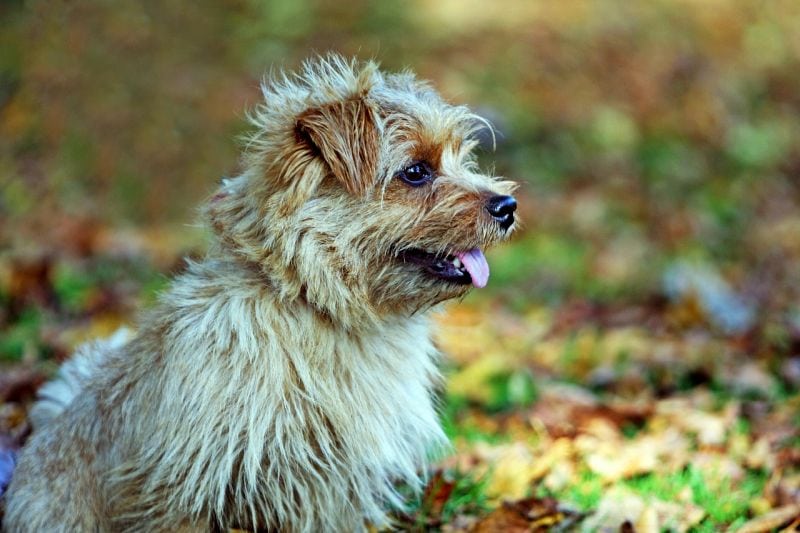
As a world-class ratter breed, the Norfolk is a fierce floof forever eager to dig, dash, and explore despite only weighing up to 12 pounds. He loves as hard as he works and plays, suiting family life well. He’s also more accepting of living in multi-dog settings, which is a bit rare among terriers.
The Norfolk’s wiry double coat requires hand-stripping to remove old, trapped hair, meaning you must learn to do it regularly or find a groomer who will. Still, this cutie doesn’t need as much grooming as some other small terriers.
13. Norwich Terrier
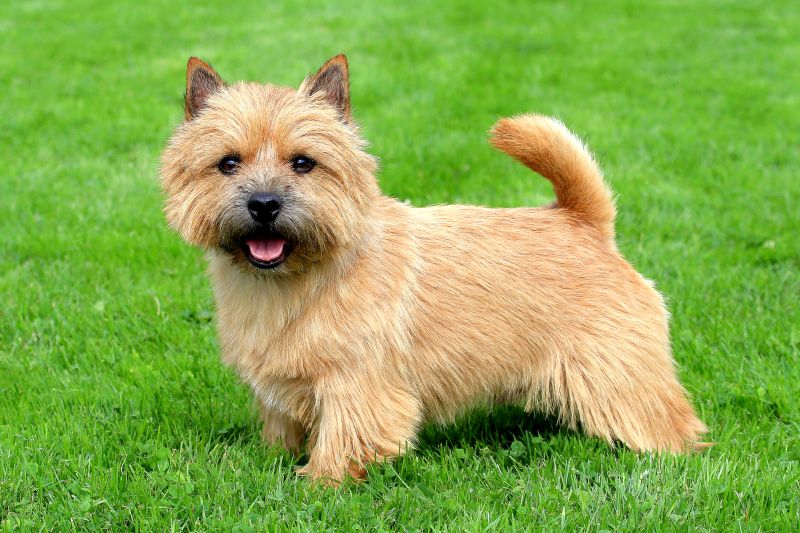
Are you seeing double after the Norfolk? You’re not alone. These canine cousins can be tricky to tell apart. How do you do it? Look at the ears: The Norfolk’s ears fold while the Norwich’s stand pricked. The Norwich weighs up to 12 pounds but has a massive friendly streak, being one of the most outgoing members of the terrier family.
It’s easy to forget this petite pupperoni is a skilled hunter, but you must keep him leashed outside of fully-fenced areas. He will chase anything that runs, with even the most well-trained pups ignoring commands in pursuit of prey.
14. Parson Russell Terrier
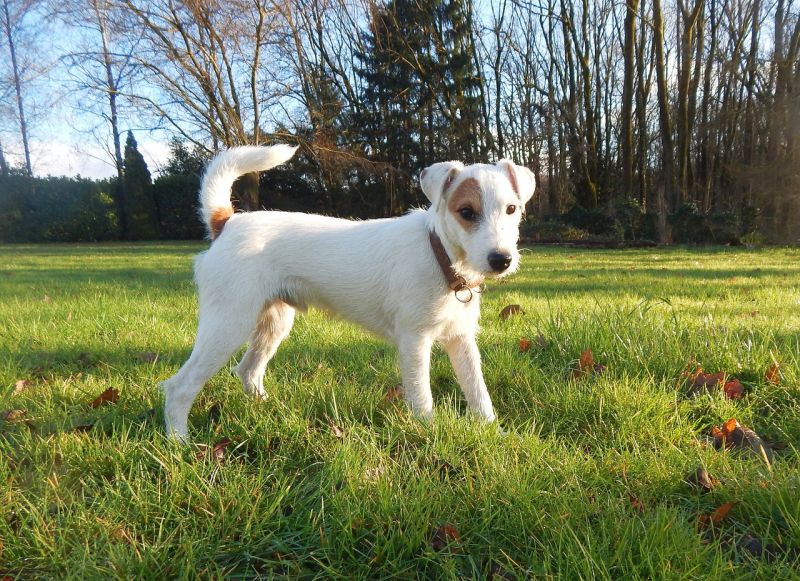
As clever as he is cute, the Parson Russell terrier’s personality is much larger than his body, which maxes out at around 17 pounds. He’s one of the most athletic small terrier breeds, excelling in Flyball and agility. He needs daily walks, mental games, and more to stay content. A proper job will suit him best since he’s a farm dog in every sense of the word.
Originally known as the Jack Russell terrier, he comes in smooth and rough coats. Both require regular brushing to keep them in tip-top shape. The rough variety has longer, wiry hairs, needing occasional stripping or clipping to prevent mats.
15. Rat Terrier
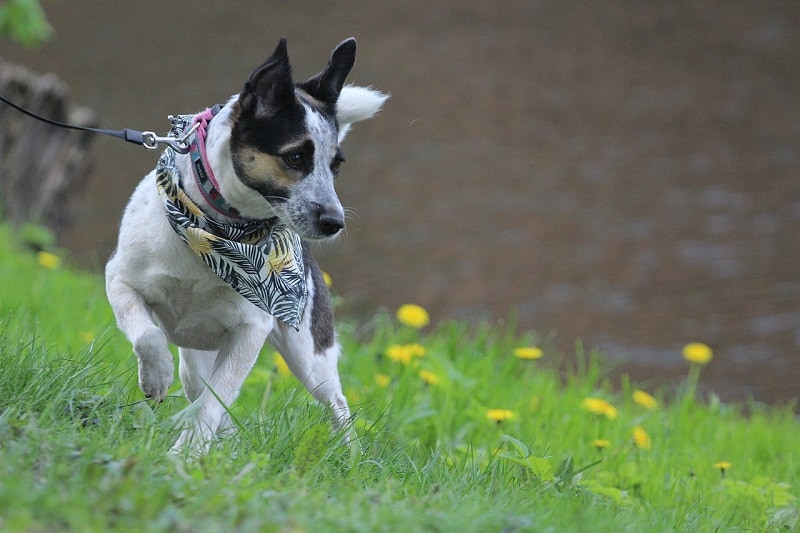
Despite his less-than-pleasant name, the rat terrier is one cute critter and a genuine lovebug, earning him a coveted spot as one of the best dogs for kids. His weight ranges from 10 to 25 pounds, as he can be miniature or standard in size. Both have a relatively sturdy frame and enjoy “big-dog” sports like agility and lure coursing.
Never trust this little one off-leash since he has a powerful prey drive. Keep his intelligence in mind, too, as this quick-witted woof bores with repetitive training and sometimes ignores handlers. Patience and a sense of humor are musts with him.
16. Russell Terrier
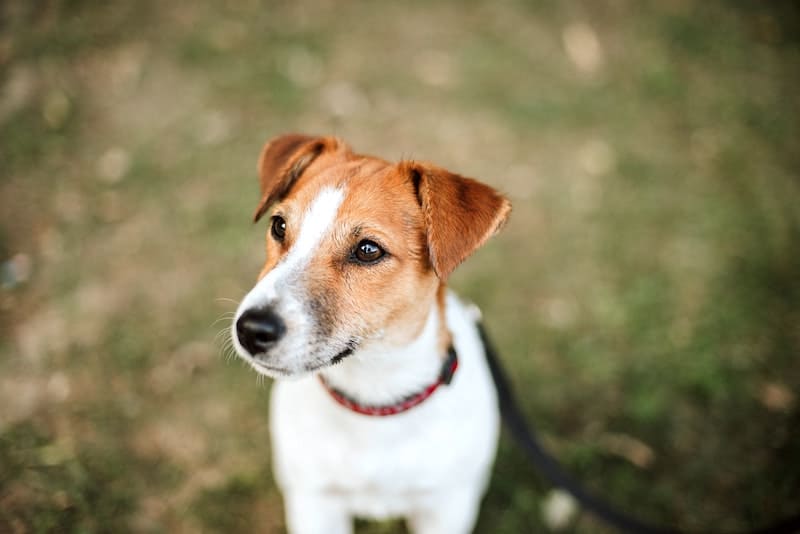
This ridder of rats is a smaller version of his Parson Russell cousin, but don’t let his size fool you, as he’s every bit as tenacious as his bigger buddy. Weighing a maximum of 15 pounds, this doggo has boundless energy, requiring a lot of physical and mental exercise and, ideally, a job.
His coat comes in rough, broken, and smooth varieties, each relatively easy to care for with regular brushing. He’s intelligent to a fault, making training a challenge at times. Remember to skip the repetition and pack plenty of treats!
17. Russian Toy Terrier
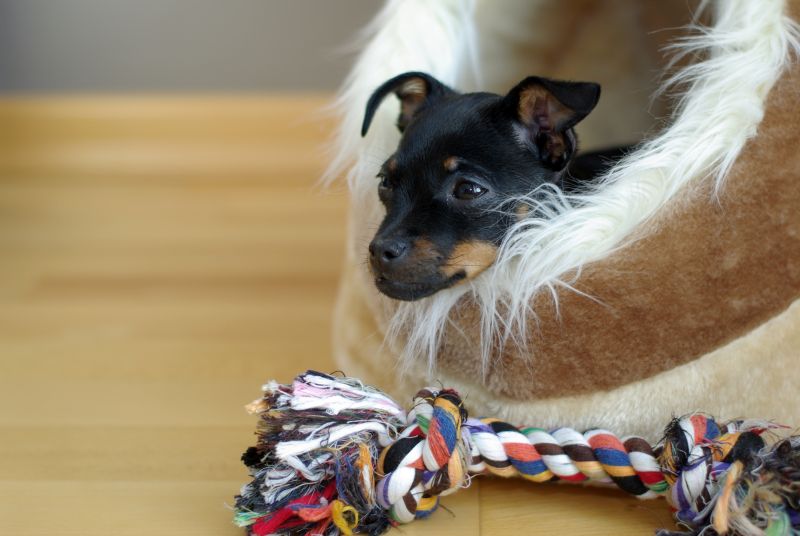
Close in appearance to the Chihuahua, this Russian Rover only weighs up to 6.5 pounds, but he’s packed with personality and fun. He’s one of the more active small terrier breeds and is happy to play inside or out. Just don’t expect him to make friends everywhere, as he can be aloof with strangers.
The Russian toy is incredibly affectionate with his favorite people, loving nothing more than to curl in your lap. Due to his small size, he’s not a good choice for families with small children or large, boisterous dogs.
18. Scottish Terrier
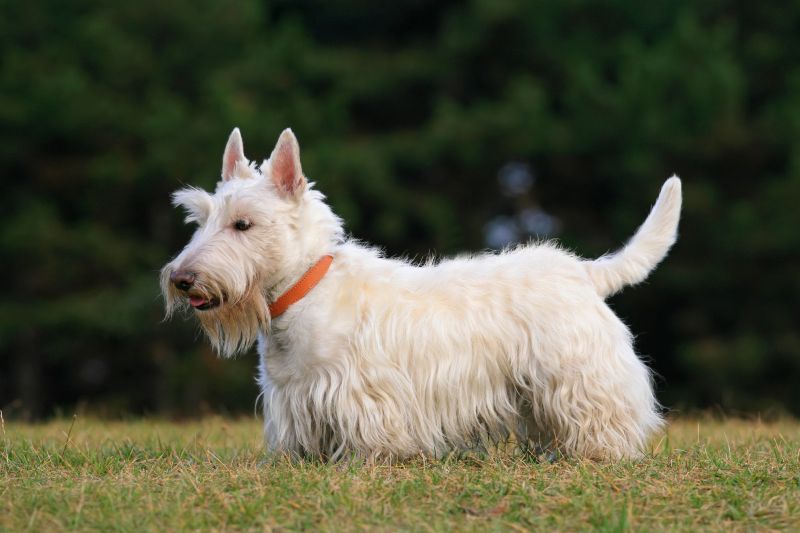
Also known as the Scottie, this short-legged sniffer is one of the most recognizable pups with his beard and pricked ears. He’s also one of the most independent dog breeds since he’s happier to do his own thing than other small terriers.
The Scottie needs regular clipping to maintain his coat. Start his grooming early on, too, to avoid any snipping at handlers. He may be a calmer canine suited for seniors, but he’s not very tolerant of things he doesn’t like, so he’s not suitable for families with kids.
19. Silky Terrier
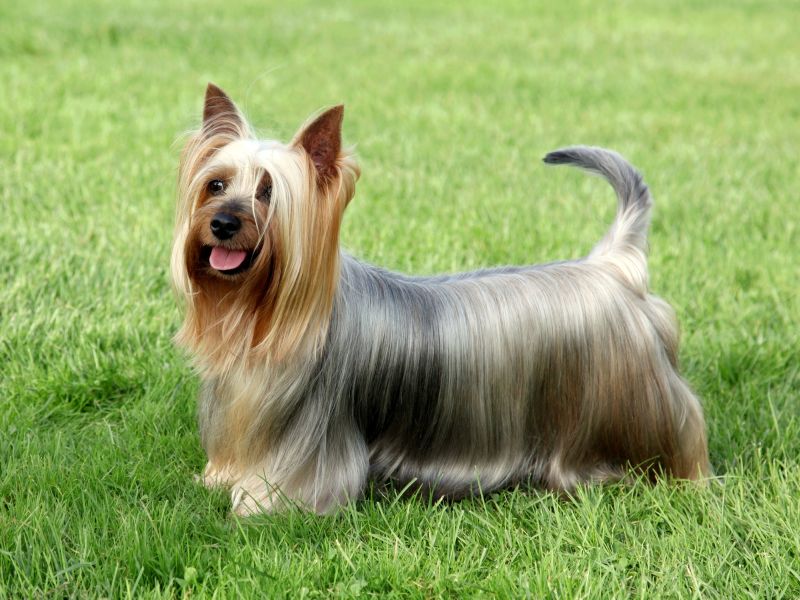
This sweet sniffer came from breeding a few other small terriers on our list, including the Australian terrier and Yorkie. Reaching a maximum of 10 pounds, he resembles a sturdier version of the Yorkie with less propensity to be yappy. That said, he’s more of a working dog than a lap warmer, so don’t expect him to laze around. He wants to explore and play by your side.
Comb your silky’s coat a few times weekly to avoid tangles, particularly around the ears, eyes, and legs. You may need to trim his bangs every so often, too, so he can see (and avoid eye irritation!)
20. Smooth Fox Terrier
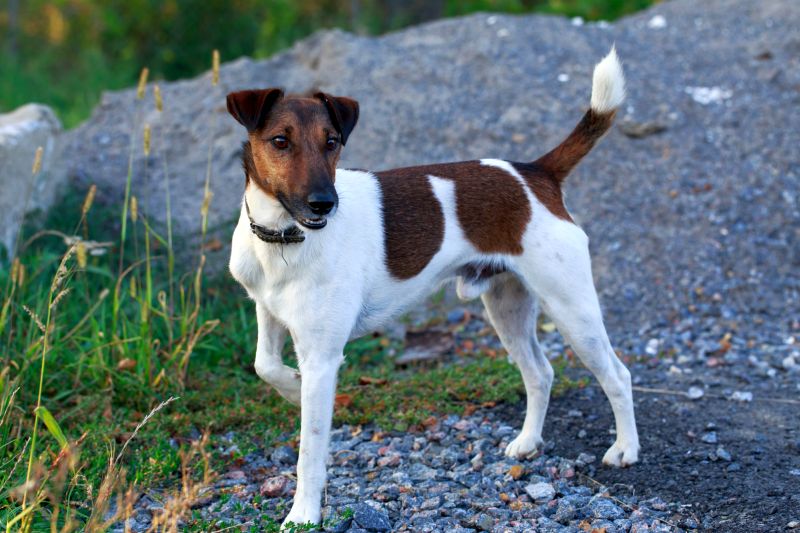
Weighing up to 18 pounds, this sleek sniffer is well-known and loved for his unique, elongated head. Everyday adventures are a must for him, including daily walks, backyard fun, and, where appropriate, digging. He’s one of the most determined diggers among terriers, so consider another pup if you have a prized patch of petunias.
The smooth fox terrier is a watchdog to the bone and is the first to sound the alarm at perceived threats. He’s also a major snuggler with his family, though he can be prone to jealousy with other pets.
21. Teddy Roosevelt Terrier
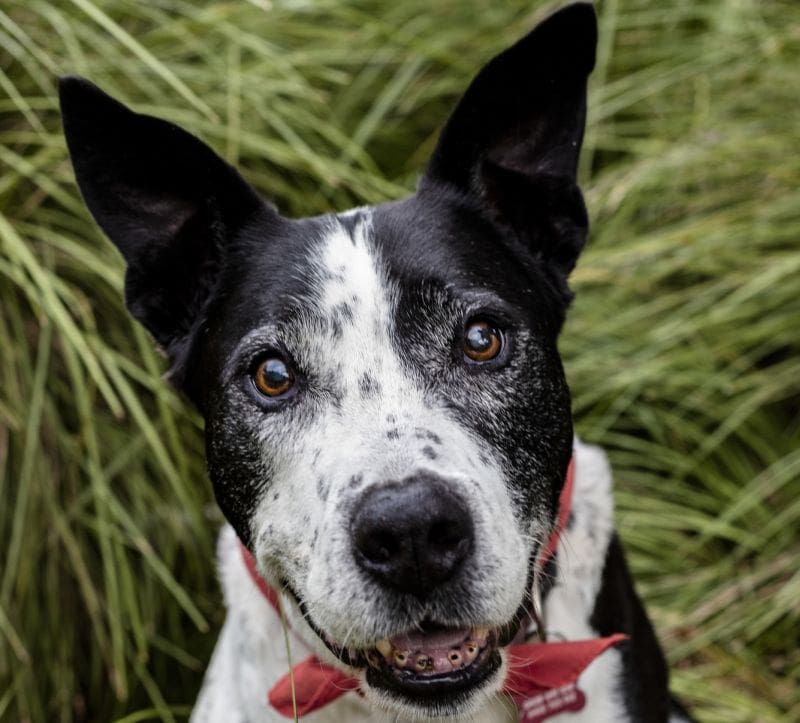
This American-made mighty mouse is a whole lot of sass in a small package. Bearing a president’s name, he has a jumbo-sized hunger for fun and exploration. This terrier is a loyal breed but tends to be more of a one-person pup, which doesn’t fit every family.
This doggo is low-maintenance in the grooming department, with his short coat only needing occasional brushing and washing. Just remember to trim his nails, brush his teeth, and clean his ears regularly as you would with any pup.
22. Toy Fox Terrier
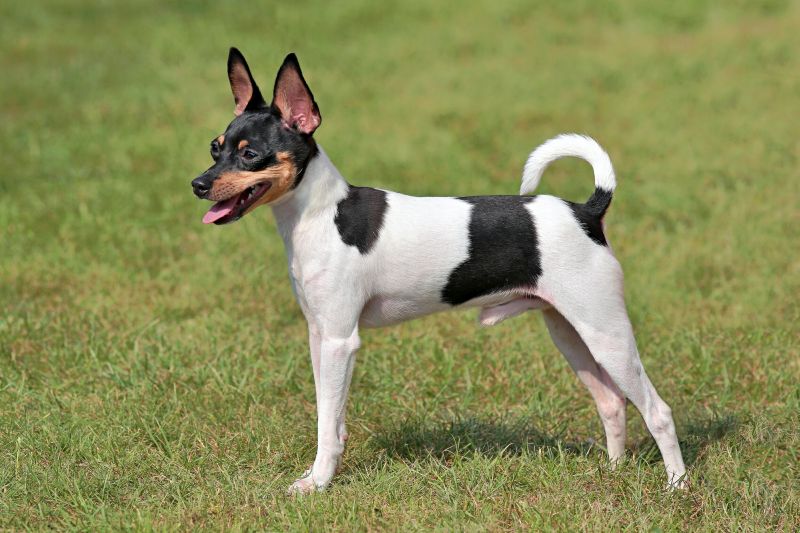
Coming in at 9 pounds, the toy fox terrier is a petite pooch with a heart many times his physical size. He’s affectionate and loyal to his people, making him a natural fit for a family with older children. His delicate nature doesn’t pair well with young kids, however.
He’s a smart cookie with minimal grooming requirements, though he does need daily exercise. He’s also one of the rare toy breeds that enjoys a good jog, making him a good choice for active owners needing a compact canine.
23. Toy Manchester Terrier
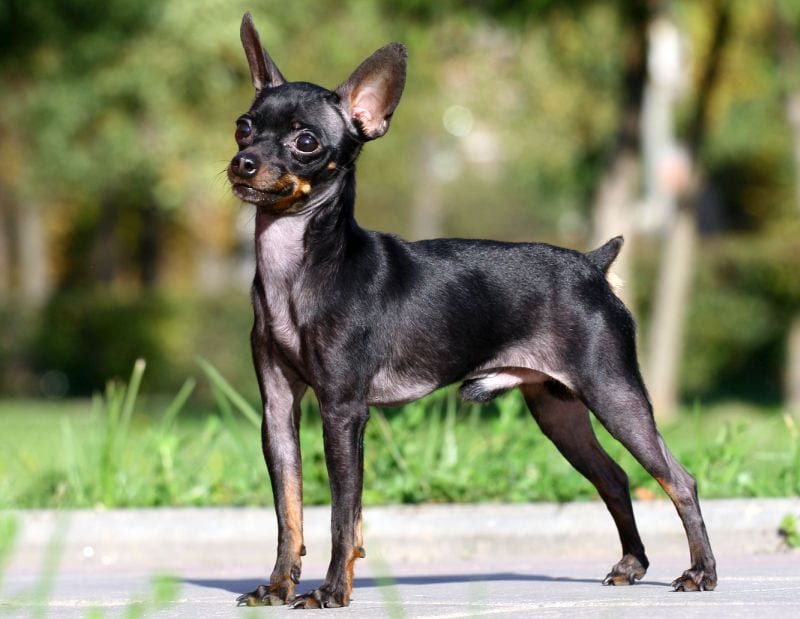
Twelve pounds is the maximum weight of this handsome devil hailing from Manchester, England. A short-haired cutie, he’s an easy keeper on the grooming front, though he’s not too keen on the cold. A dog coat is always a good idea to keep on hand with a toy Manchester terrier living in a colder climate.
He’s a brilliant barker who’s a joy to train, though he only thrives in positive settings, so keep the negativity away from this sensitive sweetheart. His cleverness combines nicely with his athleticism in sports, making him a serious competitor in agility, Earthdog, lure coursing, and more.
24. Welsh Terrier
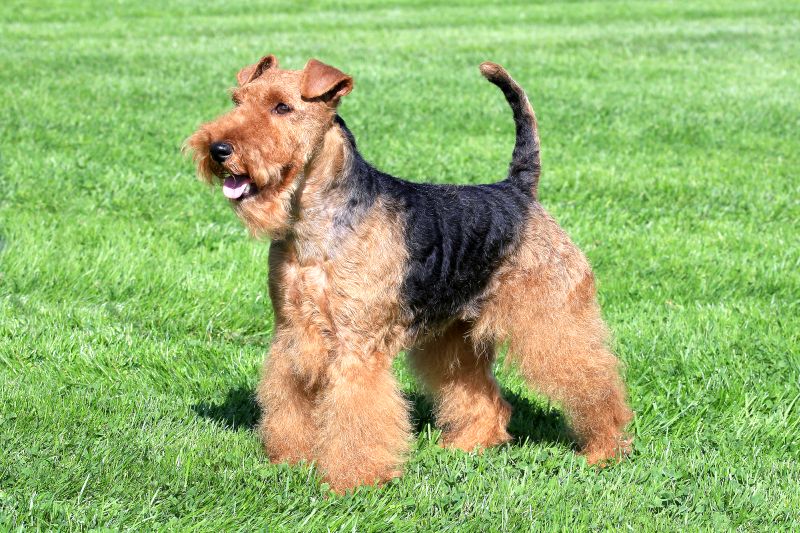
Hailing from Wales, this wise woof weighs 20 pounds at most. He’s sweet with his family and calmer than most terriers, making him a popular choice for those who love the terrier look without the tenacious temperament. He still has energy to burn, so keep up on daily walks and offer backyard fun or sports like agility to put him to work.
Like many terriers, the hardest part of owning this Welsh pup is grooming him since he needs hand-stripping and regular clipping to feel and look his best. He also requires early socialization with other canines to prevent dog selectiveness.
25. West Highland White Terrier
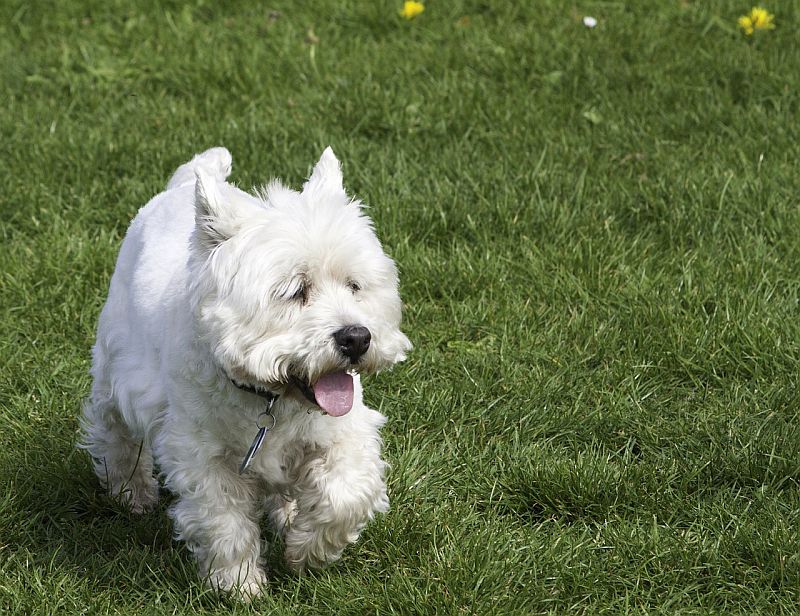
As posh as he is peppy, this small white dog breed comes from Scotland and weighs between 15 and 20 pounds. He’s a lovebug with his family and is one of the best small terrier breeds with kids. He’s a charmer, too, so don’t be surprised if he turns your next training session into a game of look-what-I-can-do.
Also known as the westie, this white woofer is naturally curious and loves to explore the world around him with daily exercise in secure areas. A lengthy walk on a long leash is one of his favorite activities, along with digging, so watch your flowerbeds!
26. Wire Fox Terrier

Bearded and brave, this Englishman is a quintessential terrier in mind, body, and spirit. Daily exercise and a leash in unsecured areas are necessary, as he will chase anything he sees as prey. His active nature lends well to events like Earthdog, but training requires patience. He will test limits, so he’s not the breed for a first-time owner.
If you’d like to keep his coat longer, it’ll require stripping by you or a pro, but for those after a no-fuss pet style, clipping every so often is just fine. Either way, you must brush him regularly to prevent matting.
27. Yorkshire Terrier
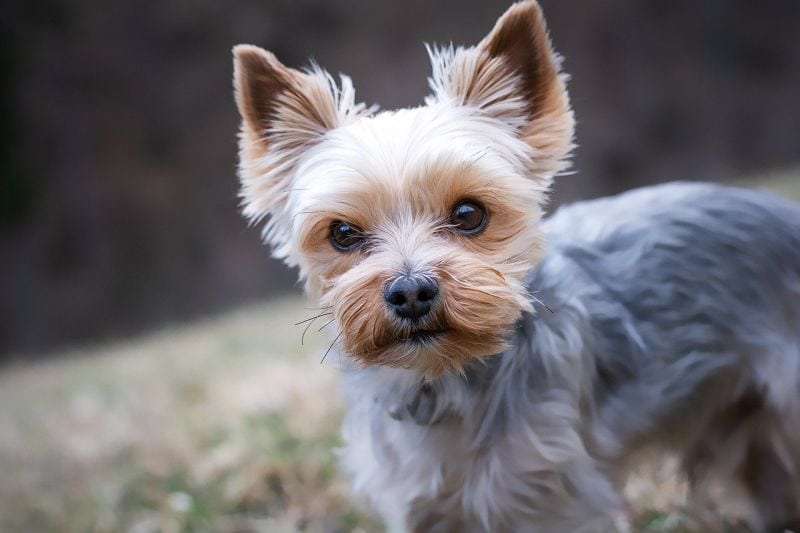
Also known as the Yorkie, this popular pup is one of the most vocal dog breeds. He will zest up your household with his opinion of strange sounds and squirrels, but all that “talking” can upset your neighbors, so he may not be the best fit for apartment life. A white noise machine can help, however.
The Yorkie is a treasured lapdog, but he’s also a top-notch adventure buddy with natural curiosity and athleticism. Paired with his compact size, he’s one of the best dog breeds for traveling.
What? No Boston Terrier?
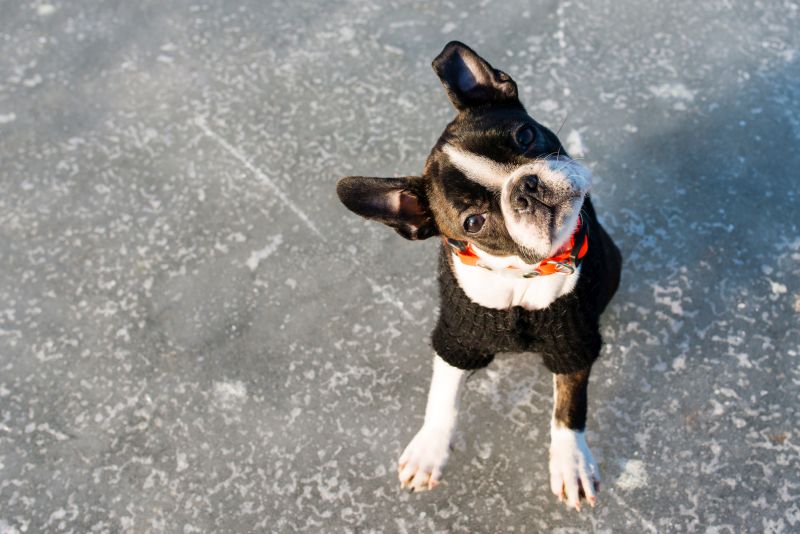
Don’t bark at us, but many don’t consider these bug-eyed brachycephalic breeds to be terriers.
While English terriers played an important part in the breed’s creation, so did bulldogs, with the end result landing to frolic in the AKC’s non-sporting group. This cute little clown still has terrier in his name, however, so he gets the last laugh.
Small breed dogs have nutritional requirements that differ slightly from their medium and large counterparts. Check out our article about the best dog foods for small breed dogs to learn more!
Terrier Traits: What Are Small Terriers Like?
Every dog group has a reputation to contend with, though few are as infamous as terriers. Many are similar in personality, activity levels, and history, but others are nothing like their terrier peers.
It’s also important to remember that every dog is an individual, so your pup may be the exception to the norm.
Generally speaking, small terriers are:
Tenacious
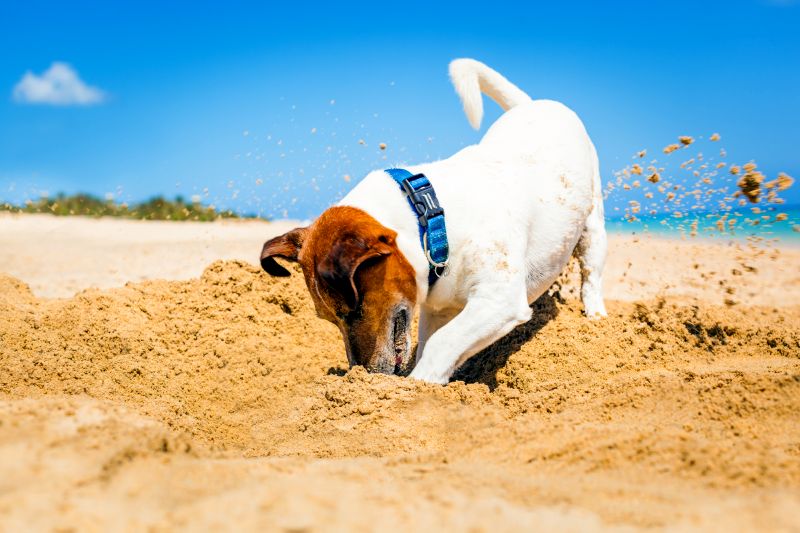
The dogged determination of terriers is legendary, with these pups putting their mind to a task and completing it by any means. This may mean digging after a mole, pursuing a bunny across a field, or unstuffing throw pillows because he discovered the fluff inside.
This fiery nature can be a win in working settings, but the average dog owner may find it too intense. The most unshakable small terriers include the Parson Russell, wire fox, and Norfolk.
Independent
Terriers often work alone in taking on vermin, so they don’t need your input and attention as much as other breeds, like retrievers. In fact, your terrier may ignore your commands at times, view them more like suggestions than orders. This willfulness makes terriers a poor choice for new dog owners, especially the Parson Russell and wire fox.
The Yorkie, Biewer, and Russian toy appreciate more one-on-one time with their pet parents than most terriers. Regardless of how independent your terrier is, daily interaction is vital in keeping your bond strong.
Dog Selective
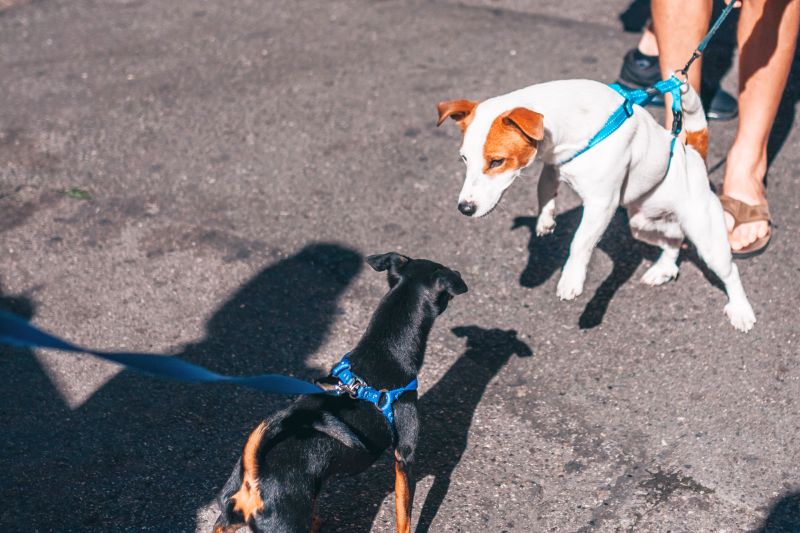
As independent workers, terriers tend to be scrappy and struggle with sharing, which isn’t a great choice for multi-dog settings. Dog selectiveness and even dog aggression can be a concern with several of these breeds, particularly the Welsh and Lakeland terriers.
Early, proper socialization is a must with every terrier to avoid any dog-on-dog drama. The most sociable sniffers in their ranks include the rat, Norwich, and Norfolk terriers.
Hardy
As canine pest control, the terrier group is rough-and-tumble and capable of handling harsher conditions than other small dogs. They don’t shy away from digging into the dirt or powering through brush other pups would find impenetrable. Some are hardier than others, with the Lakeland, Welsh, and cairn being the toughest in the bunch.
This temperament is a good match if you’re seeking a small dog that enjoys hiking and camping but can be too much if you want a daintier doggo. Among the more fragile terriers, you’ll find the Yorkie, Russian toy, and toy fox terrier.
Active
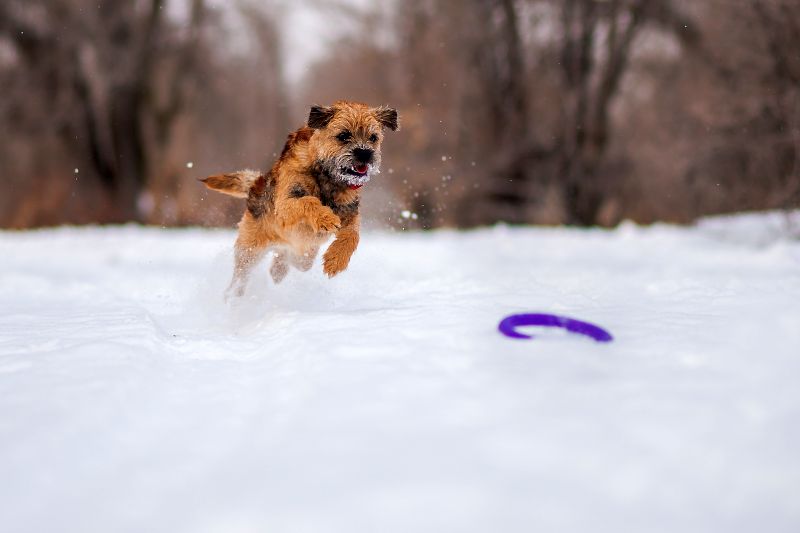
Terriers began as hard workers around the farm and home, spending time chasing prey, exploring, and digging. They aren’t a group of couch warmers by any means, with every terrier needing more exercise than low-energy dog breeds. Even the “calmest terriers” like Scotties will require a daily walk and play.
The most active terriers include the Parson Russell, border, and smooth fox. These energetic gentlemen need more daily movement than the average doggo, doing best with a jog, long hike, or canine sport like lure coursing, flyball, or agility.
Prey-Driven
Since terriers originated as expert pest exterminators, it’s no surprise that they have next-level prey drives. They will chase anything that can be perceived as prey, from passing squirrels to runaway plastic bags. Walking your terrier on a leash is vital in keeping him safe.
The terrier’s prey drive can spell trouble in families with small pets like bunnies or cats. Early training is crucial in ensuring your dog and cat get along, though some dogs just don’t fit in multi-species households. The strongest prey drives are found in Russell, wire fox, and cairn. More agreeable pups (that still need a leash outside the yard!) are the Yorkie and toy fox terrier.
Hairy
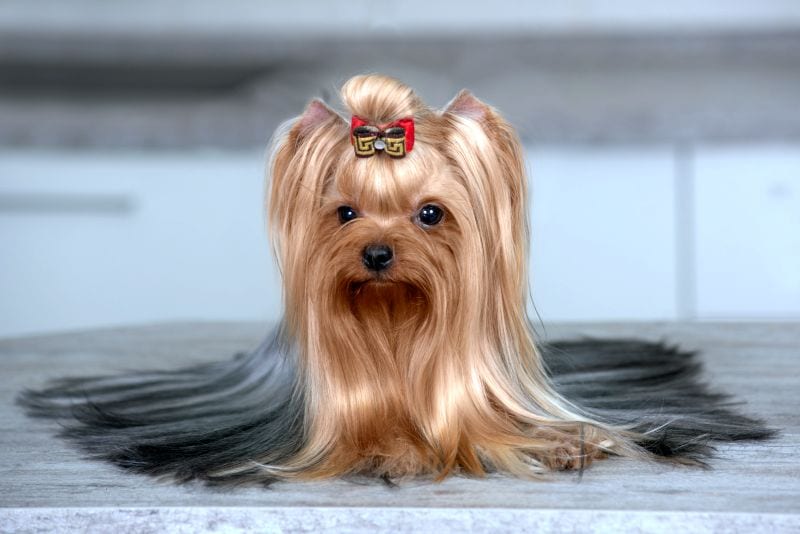
Many small terrier breeds have a harsh, wiry coat that needs special grooming called hand-stripping, particularly the Norfolk and Welsh. Others require regular clipping, including the Scottie, Westie, and miniature schnauzer. Grooming prices aren’t always cheap, so you’ll need to pad your budget with one of these woofs or invest in clippers and other gear for a DIY approach.
Not every terrier is a hairy beast, however, with the smooth fox, Manchester, and rat famously having short, easy to manage coats. You can even find a bare barker in the American hairless terrier. These short-haired pups are ideal if you’re not interested in regular grooming appointments or frequent combing.
Smart
Small terriers aren’t among the smartest dog breeds, with only one scoring above average in intelligence: the Yorkie. That said, with independence comes natural problem-solving skills and cleverness, as working terriers complete tasks solo, which means they have to think quick on their paws. That takes undeniable smarts.
Having a brainiac barker isn’t all it’s cracked up to be, as your smarty-pants pup needs more daily mental stimulation than a simple-minded mutt. He’ll also bore quickly with repetitive training and tune you out, a common issue with rat and Russell terriers.
Playful
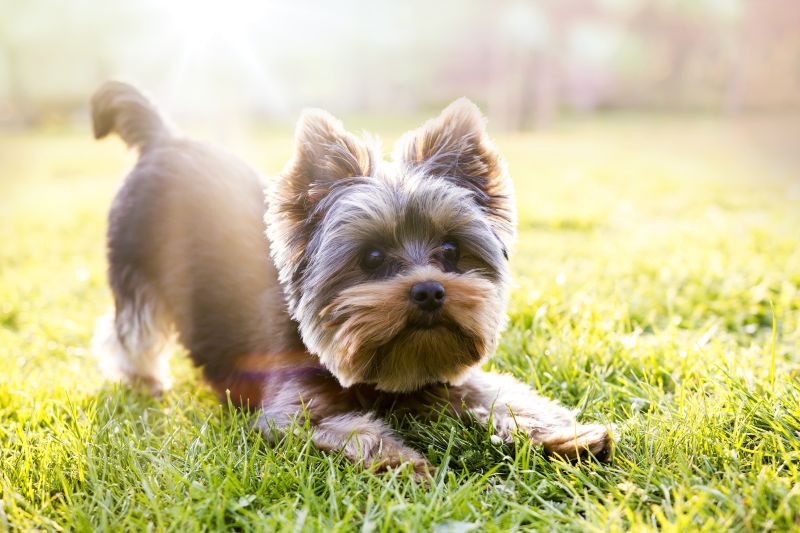
Terriers love to work hard and play harder, and many of these small sniffers – including the Teddy Roosevelt, Westie, and silky – are enthusiastic goofballs for games. They aren’t limited to one type of play, either, with small terrier breeds often enjoying games of fetch, tug, hide-and-search, and more. This natural playfulness suits families with kiddos looking for a pupper playmate.
Other small terriers, including the Scottie and Dandie, are more serious in their interests. They’re less inclined to care about human forms of fun and aren’t as eager to entertain children.
Snappy
Small terriers often get accused of being snappy, though this is likely due to small dog syndrome versus a breed-specific trait. Some, like the Scottie, are certainly less tolerant of kids and overly boisterous dogs, but terriers aren’t inherently “mean” or “snappish.”
Several small terriers are actually quite sensitive, like the Bedlington and Cesky. These delicate souls can’t handle harsh corrections or lots of craziness in everyday life, and they do best in calmer, positive households.
Your terrier may have some, if not all, of these attributes, or he may be a unicorn of a canine and exhibit zero of the “normal” terrier traits. The important thing is that you help him be the best version of himself through ongoing, positive training and plenty of everyday enrichment.
Small Terrier Breeds: FAQ
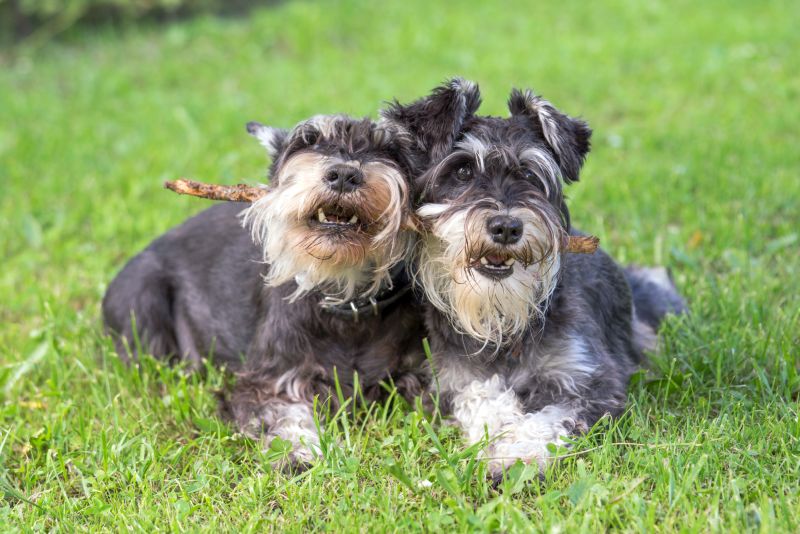
Now that we’ve met small members of the terrier group, you may have some questions surrounding these persistent pups. Let’s dig into commonly asked questions surrounding small terriers.
What is the smallest terrier dog?
The smallest terrier breeds are the Russian toy and the Yorkshire terrier. The Russian toy weighs a tiny 6.5 pounds at most, while the Yorkie’s max weight is 7 pounds. These featherweights are some of the most portable pups around, but the small side does come with risk of injury around kids and larger dogs, plus need protection against hawks.
What is the calmest terrier breed?
While no terrier is entirely calm and every pup is unique, generally speaking, the calmest in the pack are the Scottish and Welsh terriers. They aren’t as go-go-go as many of their terrier peers, demanding less daily exercise and play.
If you’re seeking a small, laid back doggo, you’re better off with one of the calmest dog breeds, like the pug, French bulldog, or Tibetan spaniel.
What is the easiest terrier to own?
The easiest terrier to own depends on your lifestyle. If you’re looking for a terrier with minimal grooming requirements, check out the Manchester, rat, or toy fox. The American hairless is another easy keeper as far as grooming, but you’ll need to protect him from sunburn if he’s the hairless variety.
The breeds just listed also tend to be the easiest to train among terriers, making them more malleable mutts than most in the group.
Are there any quiet terriers?
Unfortunately, terriers aren’t known for being quiet dog breeds, but some are relatively less talkative than others, including the Scottish terrier and border terrier. Others are infamously “chatty” like the Yorkie and miniature schnauzer.
Remember: Every dog is unique. You can find a loud Scottie as well as a quiet Yorkie. Day and night excessive barking can be helped by upgrading your dog’s digs, trying a calming plug-in, and upping enrichment.
What terrier likes to cuddle?
Terriers aren’t always cuddlebuddies, but some are more likely to snuggle at your side than others. The Yorkie is a beloved as one of the most affectionate dog breeds, and his cousin the Biewer is another all-star choice for people looking for a lap-warming woof. Short-coated cuties are cuddly too, including the Manchester, rat, and Russian toy terriers.
Do you live with any of these small terrier breeds? What’s it like sharing a home with one? Would you recommend your breed to a newbie owner, or is he an experts-only pooch? Let us know in the comments. We’d love to hear.
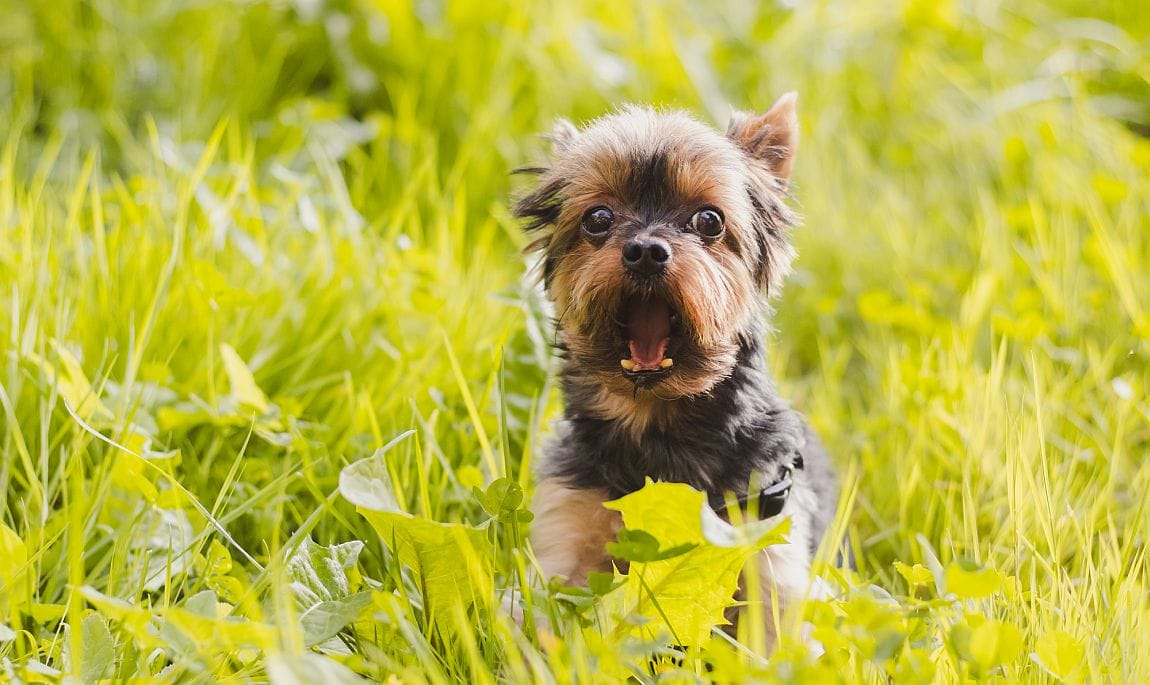

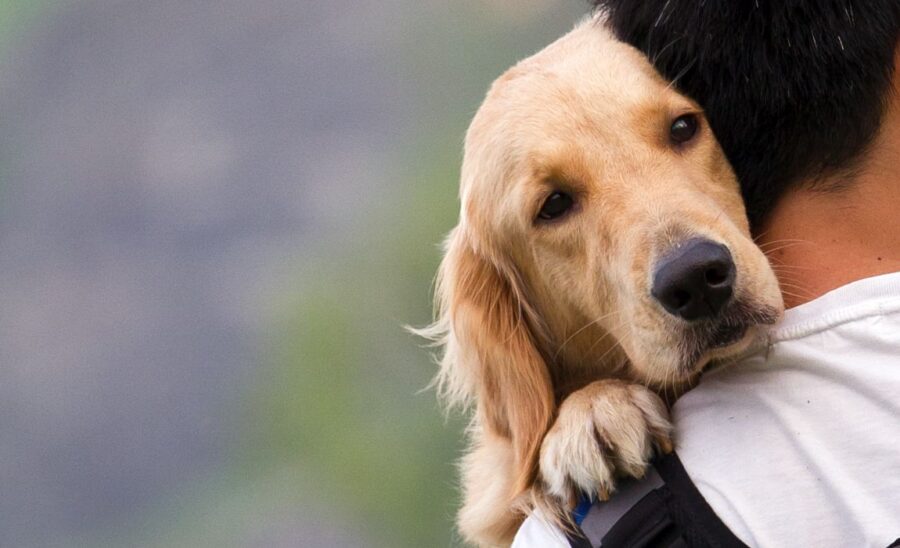


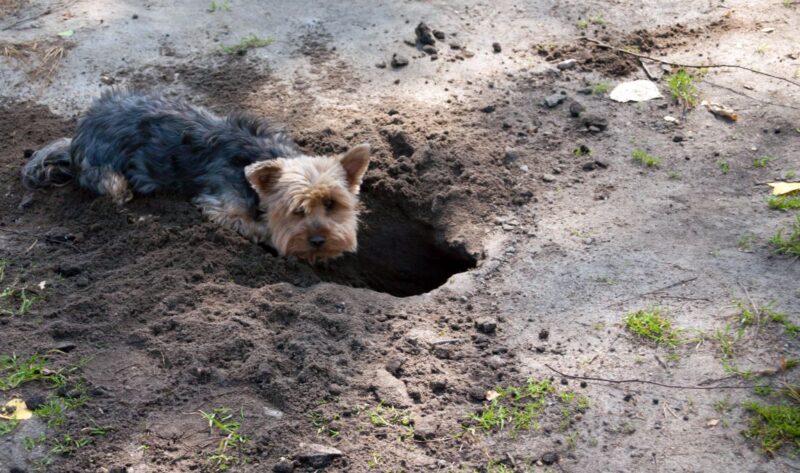
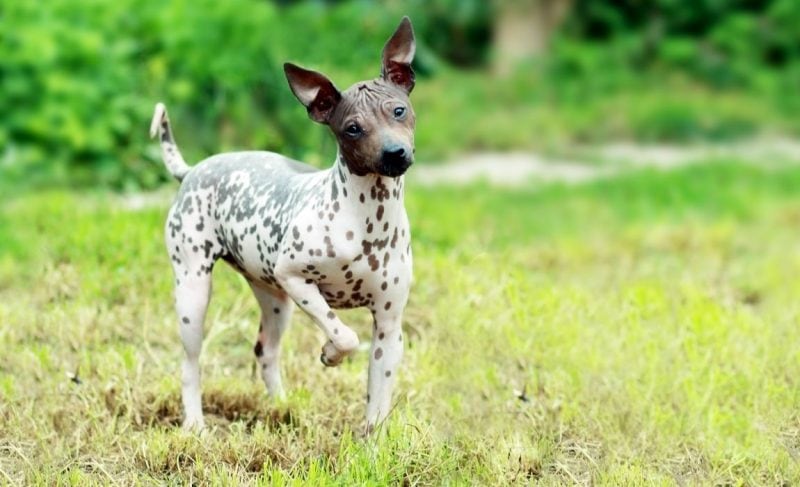
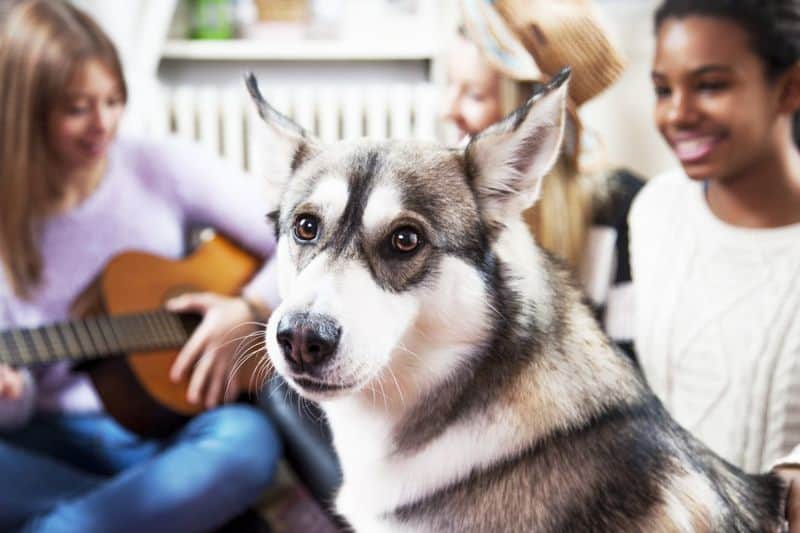
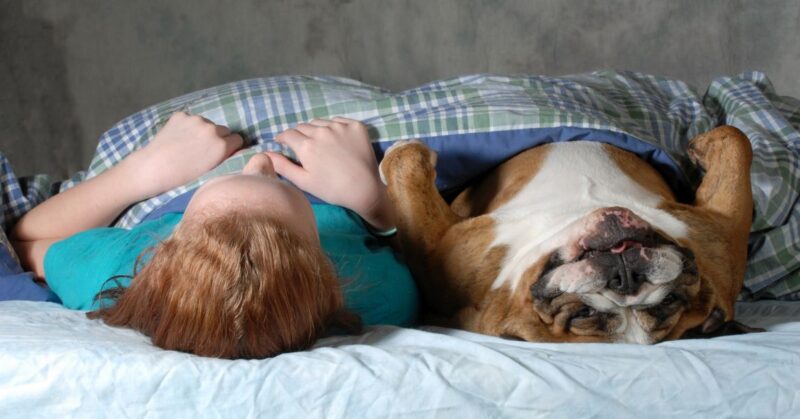
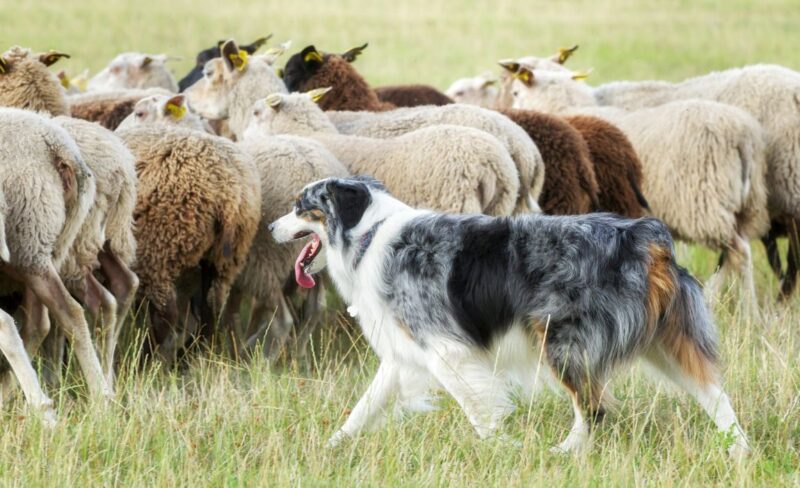
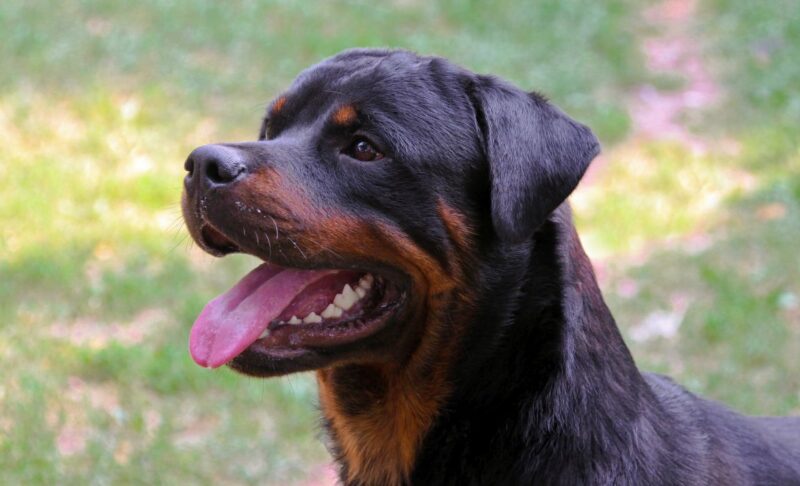
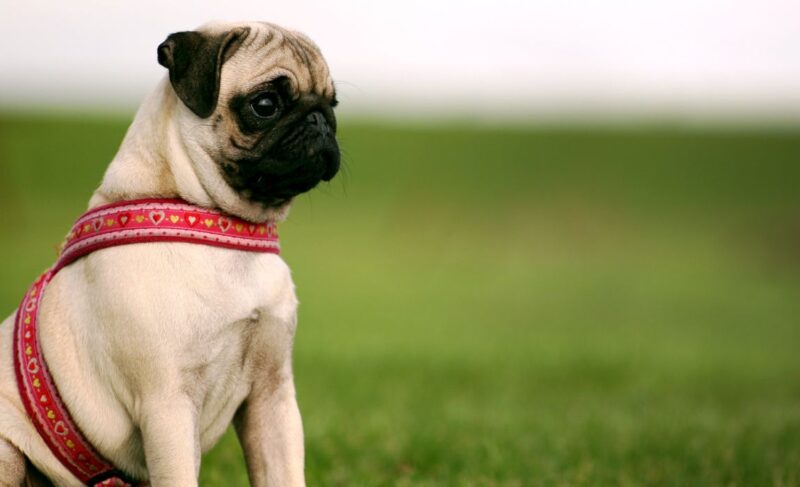

Leave a Comment